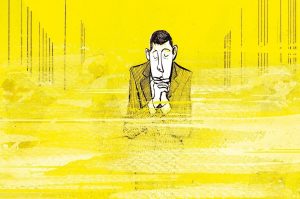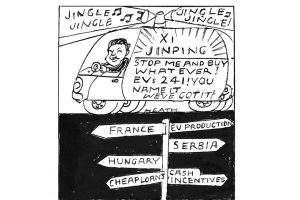At Slate, Sam Adams criticizes the Broadway production of The Music Man starring Hugh Jackman for changing a race-baiting line in “Ya Got Trouble.” Why? Because for Adams if you don’t have racism in The Music Man, you don’t have anything:
Audiences seeing The Music Man on Broadway in 1957, at the height of the moral panic over white children’s exposure to the corrupting force of Black rock ‘n’ roll, wouldn’t have needed the subtext of Harold Hill’s homily spelled out for them. But in the new production, the offending phrases have simply been wiped away, part of a wave of changes aimed at adapting the sixty-five-year-old show for contemporary viewers, some of whom have paid upward of $700 for their seats at the Winter Garden Theatre. The new version, directed by Broadway veteran Jerry Zaks, mercifully cuts the pageant in which the town’s residents dress up as racist caricatures of Native Americans, and thanks to new lyrics by Hairspray’s Marc Shaiman and Scott Wittman, the rousing singalong “Shipoopi” has been transformed from a jaunty endorsement of nonconsensual groping to an anthem in praise of men “who’ll wait till a girl says when.” But while “woke Shipoopi” has come in for a good ribbing, the changes to ‘Ya Got Trouble’ have received scant notice, despite the fact that they fundamentally change what The Music Man is about. Instead of warning against “shameless” ragtime, Hugh Jackman’s Harold Hill cautions his crowd about “modern music;” “jungle animal instinct” has been swapped for “the depths of a syncopated frenzy.” Cutting the race-baiting from Harold’s signature song feels like an easy enough fix, but combined with the excision of a line branding the rambunctious teen Tommy Djilas—whose Serbian surname would have marked him as an ethnic other in 1912—for being the son of “one a’them day laborers south a’town,” the elision leaves a vacuum at the show’s center. Are the people of River City, a diverse bunch in this colorblind production, really that worked up about the encroachment of modernity? If Harold Hill isn’t selling lightly coded racial anxiety, what exactly is he selling?”
In “Ya Got Trouble”? A lot of things. He’s selling nostalgia (“Remember the Maine, Plymouth Rock and the Golden Rule”), fear of sexual promiscuity (“One fine night, they leave the pool hall / Headin’ for the dance at the Arm’ry! / Libertine men and Scarlet women!”), fear of unemployment (“I say your young men’ll be fritterin’! / Fritterin’ away their noontime, suppertime, choretime too!”), fear of alcoholism (“I say, first, medicinal wine from a teaspoon / Then beer from a bottle!”), fear of general crassness (“Would ya like to know what kinda conversation goes / On while they’re loafin’ around that Hall?”), and fear of financial ruin (“And list’nin to some big out-a-town jasper / Hearin’ him tell about horse-race gamblin’ / Not a wholesome trottin’ race, no! / But a race where they set down right on the horse!”), among other things. He’s also selling pride:
It takes judgment, brains, and maturity to score
In a balkline game
I say that any boob can take
And shove a ball in a pocket
The list goes on. I agree with Adams that the song should have been kept as it is, but to see The Music Man as only about racial anxiety and, by extension, Trump, is so predictable it’s actually funny. There’s gotta be a bot behind pieces like this.
In other news
Eros is a pitiless taskmaster, Agnes Callard reminds us in Harper’s:
Sex without romance, romance without dating, dating without marriage, polyamory, a loosening of gender roles: our world is becoming a Wild West of romantic entanglements. Familial and religious oversight over coupling is dwindling, and the internet makes it possible to be constantly and privately available to those far beyond our immediate community. We live during a time of great romantic freedom, though we have not yet reckoned with the price. As we eliminate the social norms that guide our expectations of romance, we also liberate a monster within us. The name of that monster is Eros. It used to be commonplace to characterize romantic attraction as a destructive passion that takes over a person, making them crazily indifferent to their own well-being.
Pissarro was not a great painter, and a show that tries to make him out as one fails to convince, Craig Raine writes:
He is a sympathetic figure. But how good is he? This exhibition, edited since Basel to fit the Ashmolean’s three traveling exhibition rooms, is keen to create context and includes work by Pissarro’s contemporaries — Cézanne, Seurat, Degas, Signac, Monet, Van Gogh, Gauguin. On the whole, these painters simply outshine Pissarro. “Bouquet of Pink Peonies” (1873) immediately reminds us of Manet, with his royal flush of perfect peonies, and in particular his “Peonies in a Vase” (1864) at the Met in New York. The problem, it seems to me, is Pissarro’s slightly fuzzy version of impressionism, his uncertain execution, his approximism. The great impressionists are all lucid suggestion, touches, dabs, smears that take us accurately and swiftly to the heart of things. Their marks are perfect equivalents, exact approximations. A paradox which is not always true of Pissarro.
Andrew Stuttaford reviews Danny Orbach’s Fugitives: A History of Nazi Mercenaries During the Cold War:
After Nazi Germany attacked the USSR, Winston Churchill had no qualms about entering into an alliance with Stalin, whose regime he understood all too well: “If Hitler invaded Hell, I would make at least a favorable reference to the Devil in the House of Commons.” Similar thinking does much to explain the enlistment of former (and not so former) Nazis by the Western allies in intelligence work against the Soviets after 1945. With the Red Army in the heart of Europe, co-opting suitably qualified veterans of the fallen Reich — some of whom had very dirty hands indeed — made some sense, according to that Churchillian logic, but mainly when those selected were anti-Communist and now aligned with a democratic Germany. Danny Orbach explains in Fugitives, however, that too many failed that test, particularly the individuals who joined or worked with nascent Western German intelligence outfits.
Algis Valiunas revisits Winston Churchill’s The River War: An Historical Account of the Reconquest of the Soudan:
The River War is a masterly rendering of the clash between a civilization still at least nominally Christian and a horde of desert tribesmen under the influence of patriotic fervor enhanced by Islamist enthusiasm. Churchill is more lavish in his contempt for the Sudanese than current propriety would allow… Churchill believed above all in disseminating the worldly blessings of modern secularism: Up-to-date scientific and technical education could transform a ramshackle society into an enlightened outpost of progress. He was not out to save souls. Reducing mortal sufferings, making a largely miserable daily round easier to endure, were ambitions enough for his imperial project. He thought that Western intelligence and temperament could be grafted onto aboriginal animist or seventh-century Muslim fundamentals, and he failed to recognize that the integrity of even the most primitive religious traditions might be dearer to men than the comforts of the body.
Why we love and hate our national bird:
Why did Americans nearly drive America’s bird to extinction? In The Bald Eagle, Davis, who won a Pulitzer Prize for The Gulf, a clever history of “America’s Sea,” has written a double biography: a history of the species and a history of the symbol. Until recently, the two birds have been complete strangers to each other. Since the 18th century, the bald eagle has adorned government seals, medals, and currency, standing for integrity, vigilance, and strength. And for most of that time Americans have subjected the birds to slander, torture, and mass slaughter. Davis’s most surprising contribution is to show how adulation of the natural world can accelerate its destruction. We came very close to loving the bald eagle to death.


















